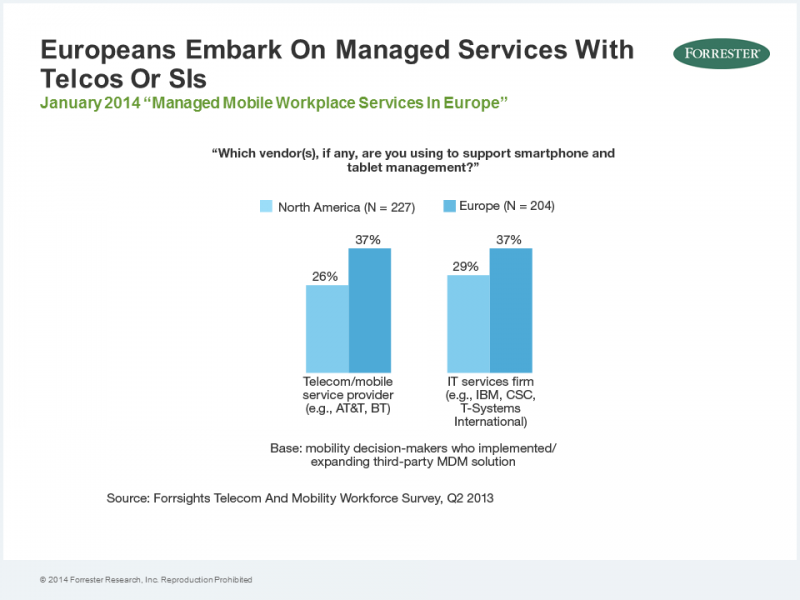Providers Are Courting European Firms For Strategic Engagements To Transform Mobile Workplace Services
Mobile device management remains the starting point for a true mobile workplace experience. VMware's recent acquisition of AirWatch isn't the first time that a leading provider of virtual desktop technology has bought mobile device management capabilities. But the road to creating a true mobile workplace experience is long. The task of meeting workforce requirements by consolidating device management, desktop management, virtualization, and the delivery of the right applications and content to mobile endpoints remains complex. A number of managed service providers are positioning themselves as strategic partners to support you in this transition. Are you ready for such an engagement? How do you select the right partner?
One obvious starting point is to check the capabilities of the provider you have already picked to manage your devices. But which of these providers are up to the challenge? Our research reveals that the European playing field is evenly shared between telecommunication providers and IT service providers.

IT Providers, Telcos, And Disruptors Are Fighting For Your Business
For our new report, Managed Mobile Workplace Services In Europe, we spoke with a number of leading telcos and IT providers that are expanding into comprehensive mobile services beyond device management. Here's our take on their plans to support your mobile workplace transformation strategy:
- Providers are raising their game to become your strategic partner.They have recognized the need to respond to business demands, and so most are investing in more business-oriented consulting or professional services. A common theme is a commitment to supporting CIO organizations more strategically, leading complex bids to manage mobile workplace services.
- Telcos and IT service providers are competing head to head. Both telcos and IT service providers offer increasingly similar portfolios for secure device management, application management, and cloud-based service operations. Telcos enter from the network and device services space, while IT players come at it from a consulting and app integration perspective. Competition is increasing as telcos invest in consulting and professional services and IT service providers invest in greater transparency and standardization of modularized services.
- Players like Google and Amazon.com are becoming serious disrupters. Google is bundling an increasing range of functionality into the standard mobile workplace. The Internet giant is not in the market for transformation based on consulting, professional services, and systems integration, but its commitment to the enterprise, constant upgrades, and ease of deployment makes it a serious option for greenfield approaches. Amazon also entered the mobile workplace arena in November 2013 with a similar approach.
Increasing Competition Gives Sourcing Pros A Greater Range Of Options For Mobile Services
In this climate, sourcing professionals face a number of good options when it comes to strategic partner selection. They can use these market developments to push for greater business agility, with transparent pricing models based on the number of users and consumption. When looking at providers, keep the following key factors in mind: their understanding of your business objectives for mobile engagement; their consulting capabilities early in the planning phase; and their ability to provide more standardized delivery modules, faster time-to-market, and transparent pricing.
Forrester clients interested in finding out more can download my brand-new report, Managed Mobile Workplace Services In Europe.